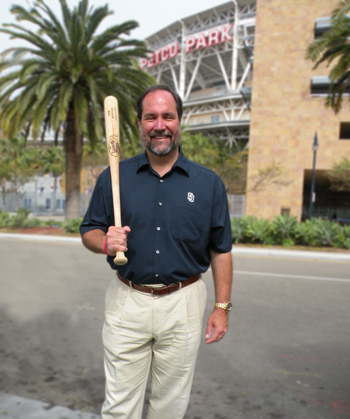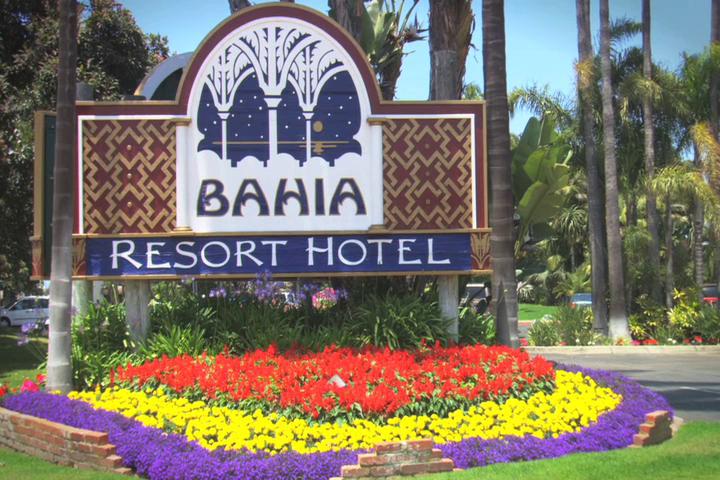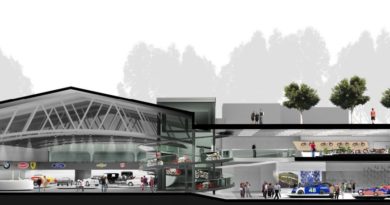Jeff Moorad has plenty of new plays in store for the San Diego Padres

By Kris Grant
Whenever Jeff Moorad speaks, you’ll see him proudly sporting a new Padres logo: “SD” it reads.
“There aren’t many cities in the country that are known by just their initials,” Moorad told members of Rotary Club of Coronado in April. “There’s LA, NY and maybe SF. We should market San Diego: SD. It’s got great cache around the world.”
The San Diego Padres’ new owner has been making the rounds of service clubs and community groups throughout San Diego to introduce himself and his vision for his ballclub.
Part of his vision for branding the Padres was to give away 40,000 Padres blue T-shirts on opening day.
“I want the fans to wear blue,” he said, “and for the team to look up and see that support in the stands.”
Moorad was CEO of the Arizona Diamondbacks in 2008 when he first heard of Padres owner John Moores’ financial woes surrounding a divorce settlement from his wife of 44 years. “I had known John for several years and when I heard he was having some troubles I reached out to him with an offer. He said ‘No.’ But he called back three months later and we structured a deal that let him hold his head up and that worked for me.”
The deal included a structured buy-in that began at 34 percent. “We’re now at 50 (percent) with the right to buy John out over the next four years, all at no interest.”
Moorad said he was recently questioned by one reporter about why he just didn’t go ahead and write a check for the whole amount now.
“I tried to give him an analogy,” Moorad said, throwing his hands up in mock despair. “I said, ‘Suppose you could buy a $20,000 car over time at no interest or pay the entire $20,000 up front, what would you do?’ And the guy told me, well, heck, he’d prefer to just get it done. I said, “That’s why you’re a reporter and I own a ballclub.’”
As the audience roared at his story, told with convivial humor, it became apparent that Moorad was a personable and approachable guy, an everyman kind of owner. The father of three school-age sons who get taken out to the ballgame more than most kids.
Moorad’s rise to the top of the athletic world began modestly enough in Modesto, where he received an Associate of Arts degree from Modesto Junior College. A clue to his later success and people skills was that he served as the school’s student body president before going on to receive a bachelor’s degree in political science from UCLA and a law degree from Villanova University.
Moorad began athletic representation in 1983 and over the course of 18 years, several in partnership with Leigh Steinberg through the firm Steinberg, Moorad and Dunn, negotiated more than $3 billion in Major League Baseball, National Football League and basketball and athletic contracts. No surprise that he was a consultant on the movie “Jerry Maguire” and had a cameo in the picture about a player agent (played by Tom Cruise) who strove for high ethical standards. The partners sold the firm in 1999, and Moorad continued a solo practice. In 2005, he ceded control of his sports management company to another sports agent to become a partial owner of the Arizona Diamondbacks and served as the club’s CEO.
And in 2009 he and a group of 12 investors struck the deal for the San Diego Padres. He still owns a small percentage of the Diamondbacks and a Hall of Fame Racing NASCAR team.
Acquiring the Padres represents a homecoming of sorts, Moorad explains. He and his wife have owned a home in Newport Beach for 25 years and have divided their time between Arizona and California over the past five. “I’m a Californian at heart,” he says, noting that as a player agent he was forced to spend long stretches of time back East. Now his boys are enrolled at school in La Jolla, where the Moorads now reside.
“Now all we have to do is win,” he quips. “I get it! I’ve been a baseball fan all my life and I know what it’s like to win.”
But he finds that very doable, and makes his case in a measured, business-plan fashion.
He compares the Padres’ current situation to that of the Diamondbacks when he took over the club in 2005. “They were in terrible shape both on and off the field. Their financials were awful and they were coming off a losing year – losing 111 games. The good news was that we had the first round draft pick of Justin Upton. I was very happy with that at the time. Now I’m not, because we have to face him.
“But we learned some things that are now applicable to San Diego. We took that club and in three years we were the best in the league — we missed the World Series by one step — we got beat by the Rockies.”
Moorad says he also knows what it’s like to root for an individual player, so he understands when fans get attached to players like Adrian Gonzalez or Trevor Hoffman. “I understand their feelings. Willie Mays was one of my favorites. “But today I’ve transitioned to a place where I put more value on the name of the front of the jersey than the one on the back.”
He’s cautious in predicting how far the Padres might go in the current season.
“Are we there today? We might be. I’m not sure if the team has matured enough to win the division. Last year we improved 12 games over the 2008 season. And we’ve put a lot of work into the fundamentals this spring. That’s part of the fun of being a fan, watching players mature.
“And Jed knows how to win, says Moorad, referring to Jed Hoyer, the Padres general manager brought in last October following his tenure with the Boston Red Sox. “He’s seen it. Tasted it. Been a part of it.”
But, while Moorad didn’t mind a record-breaking 17-2 score over Atlanta for this year’s home opener, he concedes that winning isn’t the only thing. “The fan experience must be first class. We’re seeking to provide a service level that you don’t see at the other ballparks.”
Moorad points out that if a fan came to see the Padres play and they lost, that shouldn’t be the only thing they take away. “The fact is that there’s a 160-game schedule and if you base your experience on whether you win or lose, I’m not so sure you’re going to feel so good a good part of that time.”
For Moorad, the experience begins with how fans are treated. “It’s the parking attendant, the ticket taker, the usher,” he said. And when Moorad attended the season opener, he was repeatedly pulled aside by strangers to let him know how nice the employees were.
He wants every “touch point” with customers to score points, beginning with their first call to inquire about buying tickets.
He discovered that the team’s inside sales were based in Tijuana. “Do they know anything about our brand?” he asked, already sure of the answer. Moorad soon made a change-out: “We needed to change the culture from order taker to more of a pro-active sales effort.”
So Moorad found a bunch of office cubicles on sale from a company that had gone bust. “We advertised that the Padres were hiring and we had 600 applications that we whittled down to 50 finalists for 35 jobs. We tried to hire people who believed in what we were doing.”
Now 40 sales reps fill those cubicles and they’ve even brought in a gong. “They’re excited, they’re proud,” Moorad says. “And whenever a season ticket is sold, the gong is sounded.”
Moorad was asked whether the Hispanic market wasn’t a target for the Padres. “Irrespective of our decision to move the call center in-house from Tijuana,” he said with a sheepish grimace, “yes, the Hispanic market is a big focus for us. But it’s on this side of the border, particularly throughout Chula Vista and the South Bay. We need to reach that market first, and quite frankly we weren’t doing the most effective job of it. It’s a complicated leap to go across the border where you have more difficulty with border crossings, distances, broadcasting.
Under Moorad’s leadership, the franchise queried its customer base about concerns they had and were told that price points were too high on many items. Moorad concurred and made changes: “This year we lowered 86 percent of our season ticket prices. We negotiated with our concessionaires to get them to lower prices. Now we’ve got a $5 beer — 14 ounces — and it used to be that the cheapest beer was $8.50. We have a $7 hat and an $8 T-shirt.
“We lost $8 million last year,” said Moorad. “And we’re projected to lose $6 million this year. But that’s expected and it will change as we develop the club.”
Moorad has another present on the way for San Diego: “We want to buy a new HD scoreboard, like we had in Arizona. Absolutely phenomenal resolution. You’ll love it.”
Moorad says the Padres are continuing in their commitment to the San Diego community. “We’ve dedicated our 22nd Little Padre field this year.”
He’s also dedicated to “better broadcasts.” Right now DIRECTV can’t broadcast because of a deal with Cox,” he said, but things may be changing over the airwaves in the not-too-distant future, he alluded.
And The Padre Foundation, he says is something “we need to run a bit as a public trust. The reality is that fans do in a sense own your ball club.”
With respect to the San Diego Chargers and their ongoing search for a ballpark, Moorad looks into his crystal ball and gives them a 40 percent chance of getting a Downtown ballpark. And if that deal doesn’t go through, Moorad predicts the Chargers will indeed leave town
He doesn’t particularly relish sharing the Downtown stage with a nearby sports franchise and, no, he doesn’t see any synergistic benefits. But he prefers that the deal go through.
“I’d much rather be from a two-team town than a one-team town, he says.
And he plans to make that town San Diego for the long term.



